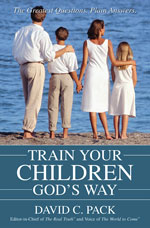Suggested Reading:
 Train Your Children God’s Way
Train Your Children God’s Way
Subscribe to the Real Truth for FREE news and analysis.
Subscribe NowControversy has erupted in California over a proposed anti-spanking bill for children under the age of four. If the bill, to be presented this week in the state legislature, is accepted, California would be the first state in America to ban spanking. Penalties would range from mandatory parenting classes to a misdemeanor with up to a year in jail and a $1,000 fine.
Current California law deems child abuse as unlawful, but permits spanking that is “reasonable and age appropriate.”
Some professionals claim spanking promotes aggression and violence, while others claim that, if used in a judicious way, spanking can be an effective and appropriate parenting technique.
In a controversy that has lasted for decades, questions arise: When does spanking become “hitting”? Similarly, spanking is often exchanged with the words “beating” or “whipping”—but are these words synonymous?
All agree that child abuse should never be tolerated. Also, it is unacceptable for parents to lose their temper and lash out in anger when disciplining their children. But does this mean all spanking should be banned?
Days after California’s anti-spanking bill was announced, a toddler and her parents were kicked off an airplane because the child had a tantrum—a scenario witnessed daily in stores across America—and would not sit down for takeoff. After 15 minutes of delay, with the little girl kicking and screaming, the airline company asked the family to leave.
Is spanking necessary to correctly discipline a child? Or would children be better off without it, better able to live productive, happy lives?
In some ways society has gone from being overly strict to overly permissive. Should there be a balance? How can parents produce happy, healthy children?
To learn hundreds of proven childrearing techniques, based off timeless principles, read Train Your Children God’s Way.